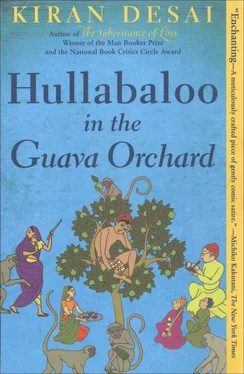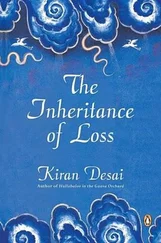Without stopping for any pleasantries, he began to shout. ‘Have you heard the news?’ he almost screamed in his high state of excitement. ‘The monkeys are threatening my son. They are threatening the ladies of the community and disturbing the peace. They are destroying the religious atmosphere of the whole compound. We must have them removed without delay.’
The Chief Medical Officer was taken aback by this vehemence. What was he to say? He had been unfairly caught at home in his pyjama kurta. This was disastrous for a person with a sensitive nature like his. First the newspaper man and now this crazy fellow. He looked desperately at the patches of butter-yellow sun upon the lawn still mostly composed of shadow. It was ridiculous for him to be the CMO when he himself was sick.
‘My respected friend,’ he said finally, thinking of the trouble that could come about if things were not left well alone, ‘you must remember that ever since the monkeys’ association with our beloved god Rama, these animals are hallowed with special affection in our sacred tradition. They have their own devoted supporters.’ He looked around again. ‘Myself included,’ he said as firmly as he could, hoping Mr Chawla would leave so he could return his mind to the subject of his stomach and give orders to his servant for onion juice to be prepared. But when Mr Chawla opened his mouth to start talking again, he lifted up the telephone receiver. ‘I will call the head of the biology department at the Lady Chatterjee University. As you perhaps know, Vermaji is an expert in human-langur interaction and maybe he will have some peaceful ideas on how to defuse this situation. Of course,’ he said after dialling the number, ‘the line is busy as usual, or else it is not working.’ And he tried again.
‘Isn’t he the same person,’ said Mr Chawla, ‘who set baits filled with sleeping pills to contain the problem at Ranchi? They did not catch even a single monkey. These animals are very street-smart. They have learned all sorts of tricks in the bazaar.’
The man they were trying to reach was at that moment studying the morning papers with great interest. Monkeys cause menace in holy man’s retreat. Last night drunken monkeys went on a wild rampage, causing people to flee the scene, he read with unnatural delight. ‘No doubt this is not the last we shall hear of this,’ he said to his wife, seated across the table from him. ‘You know,’ he went on jubilantly, ‘perhaps I will have a chance to try out my new hypothesis. If the leader of the group is killed and hung in full view of the other monkeys, they might disband and disappear into the forest … Of course, they might also just elect another head monkey …’
He was very fond of theories. Something had only to catch his attention and, regardless of whether it was a problem or not, he immediately had a hypothesis, complete with steps to be taken and possible conclusions. This trait was of great annoyance to his wife. Should she be drying dishes, he would creep up from behind and watch her with his shiny eyes. ‘You know,’ he would tell her. ‘I’m sure if you carried the dishes outside the sun would be hot enough to evaporate the water in as much time as it takes you to dry the plates. In conclusion, if the hypothesis proves true, you will save energy and time.’
But what about the time and energy it would take her to carry out the dishes and spread them upon the balcony? She was infuriated. Or would he carry them out for her? All his theories, in her opinion, were worth nothing. She remembered the time, years ago, in the terrible summer of drought, when he had invented a fan to draw monsoon clouds into Shahkot. And the last time he had tackled the monkey problem, he had had to concede complete failure. The monkeys had not eaten a bite of the sleeping-pill-laden food; hungry street urchins had gobbled it down instead, and then promptly fallen into a deep sleep that lasted, in one case, up to forty-eight hours. It had caused a terrible uproar among the slum dwellers … Not that this disaster had dampened her husband’s zeal, of course. Here he was with yet another idea that would cause trouble for a lot of people and end in nothing.
‘Disband?’ said his wife. ‘The monkeys will probably attack you instead, and if they don’t, all the Hanuman Monkey Temple people will, and you will be khitchri,’ she announced with satisfaction.
Really, his wife had a bizarre sense of humour, one with rather a vicious edge, he thought. She had no scientific training at all, but apparently had no inhibitions about attacking his every thought with childish retorts. This is what he got for sharing his intellectual pursuits with her. Sighing, he picked up the telephone to call the CMO, who might perhaps be able to give him some more information on the monkeys’ misdeeds.
Way off in the local army outpost on the edge of town, the commotion of the morning continued. The Brigadier, who had just finished with the papers, picked up the ringing telephone.
‘Chief Medical Officerji?’ said Verma.
‘Wrong number,’ said the Brigadier.
‘Sorry,’ said Verma.
A second later the phone rang again. ‘Oh, sorry,’ said Verma. ‘You know how mixed up the telephone lines are in this town — only now and then do you get the right number.’ A few minutes later: ring, ring.
‘Will you stop phoning me?’ shouted the Brigadier angrily.
Tring, tring. ‘Oh, sorry, sir.’
The Brigadier slammed down the phone, unplugged it and retired to the bathroom, where he sat upon his Western-style toilet with his binoculars, looking carefully for any birds that might be about that morning. He was on an endless quest to raise the count of birds he spotted in the area: bird-watching soothed and relaxed him like nothing else in his regimented life. Cormorants, black storks, paddy birds, cattle egrets, little bustard quails; orioles, drongos, chestnut-bellied nuthatches; barbets and honey guides; parakeets and nightjars; flycatchers and hoopoes. The list went on and on, but it was his dream, more than anything, to be able to list the green pigeon in his bird-watching logbook; yes, the simple green pigeon, that had for so long been invisibly goading him with its song. Everywhere he went, the Brigadier carried his book with him so he might write down the name of each bird as he saw it, but he recorded most of his sightings from the bathroom window, which had the best view of all: over the valley and with a bank of fruit trees nearby. ‘Treron phoenicoptera phoenicoptera,’ he murmured to himself like a mantra.
But that morning not even a crow or a sparrow interrupted the unbroken expanse of sky. Disappointed, he lowered the binoculars and watched his soldiers going through their morning exercises on the parade ground instead. Hop. OneTwoThreeFour. Hop. FiveSixSevenEight. Hop. NineTenElevenTwelve. It was all very well, he reflected, thinking back to the morning’s events, that his soldiers should hop and march, but what use was there for all this discipline?
Left, right. Left, right. Stand at ease.
What hope was there for the army? When the telephone system did not work and, he remembered the newspaper reports, when monkeys developed a taste for alcohol and went on the rampage?
He leaned out of the window, still on the toilet seat, with a megaphone, to shout: ‘Double march. Jump to it.’
The soldiers, realizing they were being mysteriously observed from farther up the hillside, leapt like frogs and, in their confusion, scattered in all the wrong directions.
Somewhat mollified and feeling better about the day after having shouted at his men, the Brigadier retired for his bath. He looked up the schedule that was mounted behind plastic on the wall by the water taps. ‘Monday,’ it read, ‘back of the neck and ears. Tuesday, between the toes. Wednesday, the back,’ and so on. Ah, it was his day of the week for washing behind his ears and neck. Each morning he paid attention to a different tricky part of the body. In this way, in seven days, every crease and crevice and difficult-to-remember spot was given a good scrub, despite water rationing. Of course, he washed his face every day.
Читать дальше












